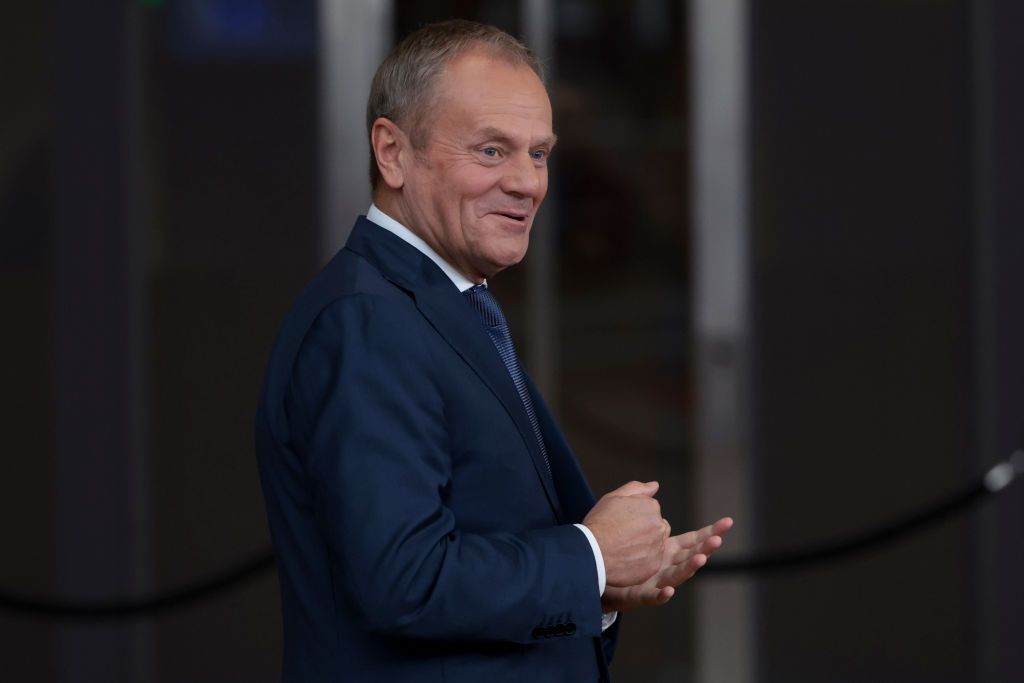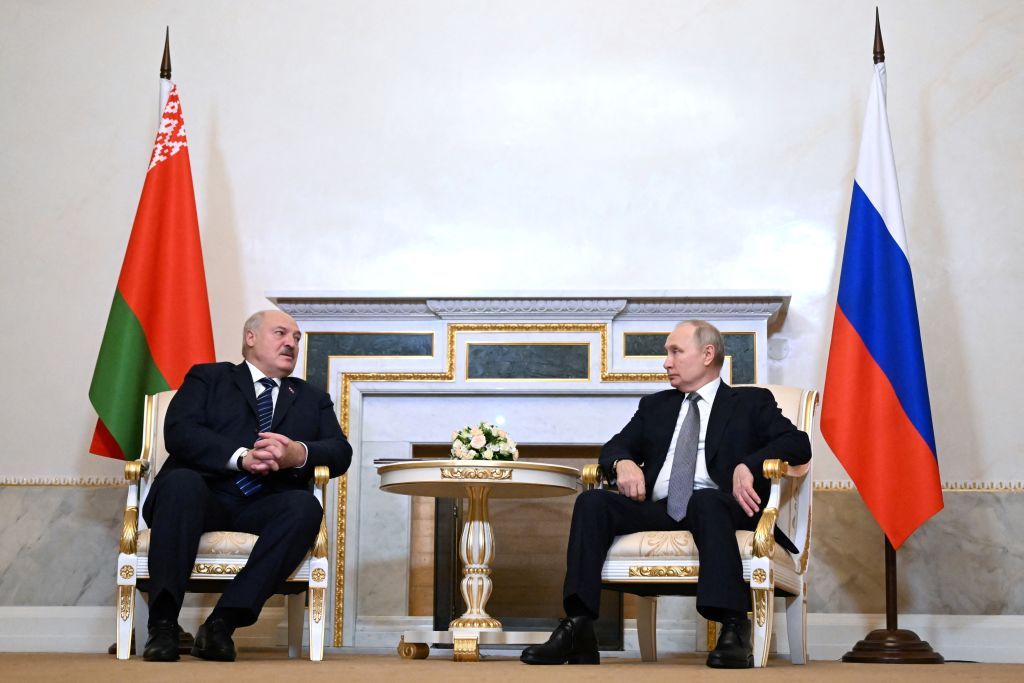The Polish government approves Donald Tusk's controversial migration strategy, suggesting to temporarily suspend the right to asylum amid the artificial migration crisis orchestrated by Belarus.
Lukashenko says Russia’s nuclear weapons deployment in Belarus was long overdue, confirms Russian control over nuclear warheads.
Belarusian political prisoner Palina Sharenda-Panasiuk re-sentenced for a third time.
Russian MiG-31K jets briefly deployed in Belarus for the first time in 18 months.
RFE/RL investigation reveals Belarusian fertilizer producer has been supplied to Ukraine despite EU and Ukraine sanctions.
Unilever sells its Russian, Belarusian businesses.
Poland’s government approves migration strategy suspending right to asylum
Polish Prime Minister Donald Tusk announced on Oct. 15 that the Polish government approved the new migration strategy, which includes a temporary suspension of access to asylum.
“A difficult decision, but a much-needed and much-anticipated one,” Tusk wrote on X (formerly Twitter) following a discussion of the issue by the Polish cabinet.
According to Polish broadcaster TVP, the strategy includes tightening visa and job permit regulations, introducing integration programs and a “citizenship test,” and – highly controversially – temporarily suspending the right to asylum.
“In the event of the threat of the destabilization of the state by an influx of migrants, it should be possible to temporarily and territorially suspend the right to grant asylum,” TVP said, quoting a statement from Tusk’s office.
Tusk announced his plan to suspend the right to asylum on Oct. 12 during the Civic Coalition convention, sparking criticism and taking other coalition members by surprise.

Pointing to waves of illegal migrants from the Middle East and Africa arriving from Belarus, which Tusk claimed were being sent by Belarusian dictator Alexander Lukashenko and Russian President Vladimir Putin to “exploit” the right to asylum “against the essence of the right to asylum,” he announced the plan to temporarily suspend the right in Poland and demand that the EU recognize this suspension.
“The government will not implement European ideas that harm Poland’s security, such as the migration pact,” Tusk said, referring to the newly adopted set of reforms to European migration policy. Poland opposed the pact, citing its failure to address the “hybrid war” that the country has been facing since 2021, with an influx of illegal migrants from third countries storming the country’s eastern border.
European Commission spokesperson Anitta Hipper claimed that protecting the border and granting asylum to refugees are not mutually exclusive. She said it was important to protect EU borders but reminded Poland of its international commitments, including to asylum procedures.
“The EU expects all members to implement the provisions of the migration pact,” she told the Polish news agency PAP.
Szymon Holownia, the Polish parliament speaker and leader of the center-right Poland 2050 party, which is a member of the current coalition government, said Tusk had announced the new strategy without consulting his coalition partners.
While supporting the notion of returning control over the borders, Holownia maintained that any suspension of the right to asylum could occur if there were a significant exacerbation of the border situation and under martial law or a state of emergency, as described in Poland’s constitution, and not before such conditions came into effect.
“I stand, and we stand by the position that security is absolutely paramount, but security does not exclude humanity,” Holownia wrote in a Facebook post before the cabinet meeting.
Tusk’s announcement also sparked an outcry among Human Rights organizations in Poland. Along with over 40 non-profits, Amnesty International Poland filed an appeal regarding the announced plans, saying they were in breach of the Geneva Conventions, international treaties, and the Polish constitution. “The rights and freedoms to which every human being is entitled are not subject to discussion and political bargaining or bidding,” Amnesty said in a statement.
The move may affect hundreds of Belarusians seeking asylum in Poland amid political reprisals in their country. Since the suppression of nationwide anti-government protests in 2020 in Belarus, Poland has been host to the largest number of Belarusian asylum-seekers.
Warsaw has for several years accused Belarus of engineering a “hybrid war” against Poland by deliberately pushing migrants into the country in order to pressure the EU. Belarus denies the accusation.
According to Polish Vice Prime Minister and Defense Minister Władysław Kosiniak-Kamysz, in 2024 alone Poland has stopped 26,000 illegal border crossing attempts. One Polish soldier died in a clash with migrants in June. Poland’s officials note that arriving migrants have Russian visas, proving the Kremlin’s involvement in the recent inflow of migrants. Continuous crossing attempts by migrants prompted Poland, Latvia, and Lithuania to build walls along their borders with Belarus.
Lukashenko claims Russian nuclear weapons deployment was long overdue, confirms Russian control over nuclear warheads in Belarus
Belarusian dictator Alexander Lukashenko has told Russian reporters that recent changes in Russia’s nuclear weapons policy were long overdue and would likely “cool the ardor” of Western nations.
Following a meeting with Russian leader Vladimir Putin in Moscow, Lukashenko told the press on Oct. 13 that “hotheads” in the West had already noticed nuclear signals from Putin even before the changes to Russia’s military doctrine were announced.
“If they hadn’t heard this, they’d probably be bombing us, especially Russia, with those long-range missiles by now,” Lukashenko claimed, referring to discussions in the United States and the UK about allowing Ukraine to strike deep into Russian territory with Western-supplied long-range conventional missiles.
The changes to Russia’s nuclear doctrine announced on Sept. 25 expand the possibility of a nuclear response to an attack against the Union State, which includes Belarus and Russia, by a non-nuclear state with conventional weapons “if it poses a critical threat or if backed by a nuclear state.”
Lukashenko also indirectly confirmed that Russia retains full control over the use of the nuclear weapons deployed in Belarus. In a deviation from his repeated claims that he would “not hesitate” to use the tactical nuclear weapons, Lukashenko confirmed that this would only be possible after consultations with allies.
Previously, on Oct. 8, Lukashenko told Russian reporters that Minsk would have to hold “serious negotiations with Putin” if the issue of the use of nuclear weapons came up.
“Look, even if we, like North Korea, had weapons manufactured and built at home, never in our lifetime would any country use them on their own without consulting their allies, let alone without consulting with the Russian Federation,” Lukashenko said.
Minsk, which has no nuclear weapons of its own, joined Russia’s nuclear blackmail campaign in May 2023 by signing an agreement to station Russia’s tactical nuclear warheads in Belarus. According to then-Russian Defense Minister Sergei Shoigu, Russia would remain in control over the weapons and any decisions regarding their use, while maintaining that the Kremlin still adhered to the Nuclear Non-Proliferation Agreement.
Lukashenko, however, subsequently made several blustery statements claiming there would be “no hesitation” if he had to decide to use the weapons. On June 27, 2023, Lukashenko ordered the development of an “algorithm” for the use of the tactical nuclear weapons deployed to Belarus from Russia. However, the nature of this algorithm remains unclear, given his acknowledgement that tactical nuclear weapons have to remain under Russian control.
Belarus took part in Russian nuclear drills in 2024. However, no evidence of an actual transfer of nuclear warheads from Russia to Belarus has ever been provided.
Ukraine has condemned Russia’s nuclear posture as blackmail, with President Volodymyr Zelensky urging Western leaders to ignore Putin’s “red lines,” while Moscow insists that its warnings are genuine. Putin has previously warned that if the United States and its allies approve Ukraine’s use of long-range missiles, they will be engaging directly in the war against Russia.
Belarus re-sentences political prisoner for third time
Belarusian activist and political prisoner Palina Sharenda-Panasiuk has had her prison term extended for a third time after being charged with “malicious disobedience to the penal colony administration,” her husband Andrei Sharenda reported on Oct. 15.
Sharenda-Panasiuk, a mother of two, was charged in 2021 with two years of imprisonment for insulting Belarusian dictator Alexander Lukashenko and allegedly attacking a policeman. In detention, she was repeatedly placed in a punishment cell and solitary confinement, and was deprived of care packages, including vital medicine.
The latest charges were brought against her two days before her scheduled release date, according to the Viasna Human Rights Center. The trial on Oct. 14 added another year to her sentence, extending it to four full years in prison.
Sharenda compared the new ruling to a death sentence, citing his wife’s deteriorating health.
“Palina’s life hangs by a thin thread that could break at any moment,” Sharenda wrote on Facebook.
Relatives say Sharenda-Panasiuk has developed chronic pancreatitis of moderate severity while in jail, and human rights activists say her health issues are cause for “significant concern.”
After being jailed, Sharenda-Panasiuk received two additional prison sentences for alleged “malicious disobedience” – in April 2022 and in October 2023. She testified in court that she had been beaten by other inmates of penal colony #24 on orders from the administration.
She also reportedly filed an official application to renounce her Belarusian citizenship in protest at being subjected to torture in the penal colony.
Charges of “malicious disobedience” against political prisoners have increased since the crackdown on dissent that followed the fraudulent 2020 presidential elections in Belarus, the Viasna Human Rights Center reports. At least 33 prisoners were subjected to repeated convictions, with charges being brought on flimsy grounds. The charges serve to exert additional pressure on prisoners, as extended sentences can be issued virtually indefinitely.
Currently, human rights organizations have recognized as having been detained by the Lukashenko regime. Despite recent rounds of pardons being granted by Lukashenko, resulting in the release of 115 individuals, more activists have since been jailed and recognized as political prisoners.
Russia briefly deploys MiG-31 jets to Belarus for first time in 18 months
Two Russian MiG-31K jets, capable of carrying hypersonic ballistic Kinzhal missiles, were briefly deployed in Belarus between Oct. 9 and Oct. 12, sparking concerns of potential strikes and speculation that Russia may be attempting to shield the scarce warplanes from long-range Ukrainian attacks.
The two MiG-31K jets landed in Belarus on Oct. 9 and 10, a year-and-a-half after they last touched down in the country. The aircraft is capable of launching Kinzhal air-to-surface ballistic missiles, which have an operational range of 2,000 kilometers (1,200 miles). The missiles are extremely difficult to intercept and shoot down.
According to Peter Layton, associate fellow at the Royal United Services Institute, a UK defense and security think tank, visiting fellow at Griffith Asia Institute, and former Australian Air Force officer, Russia might have moved the jets to protect them following successful Ukrainian strikes on Russian airfields.
“The MiG-31s could be based in Belarus, and then fly into Russian airspace to launch their weapons, and later return to Belarus, where they would be considered safer,” Layton told the Kyiv Independent.
Another potential reason for the deployment of the warplanes could be for them to carry out provocations or attacks on Ukrainian targets, Ukrainian officials have claimed.
However, the war monitoring group Belarusian Hajun suggests that the aircraft most likely returned to Russia on Oct. 10. After taking off at 3.10 p.m., the jets travelled south to Baranavichy and then exited Belarusian airspace to the east, into Russia.
“Thus, at the moment, it is most likely that the MiGs left the territory of Belarus after take-off and returned to Russia,” the group said in a .
Some political analysts have said they consider the broadcast to be a “bargaining offer to Washington” from the Lukashenko regime, as it comes against the backdrop of the recent release of 115 Belarusian political prisoners, “pardoned” by the Belarusian dictator.
Russian ally Belarus has not deployed its troops to the battlefield but has supported Russia’s war efforts by providing its infrastructure and territory for Russia to carry out attacks on Ukraine.
In 2022, Russian forces launched air attacks on Ukrainian targets from Belarus.
RFE/RL reveals sanctioned Belarusian fertilizer plant has been supplying Ukraine
Belarusian fertilizer producer Hrodna Azot has been supplying its products to Ukraine, bypassing European and Ukrainian sanctions, the Belarusian service of U.S. government broadcaster RFE/RL service has reported, citing documents from Kyiv’s Shevchenkivskyi District Court.
According to RFE/RL, Hrodna Azot has been using a network of intermediaries, including a firm in Dubai in the United Arab Emirates, to supply Kharkiv-registered company Oscar Optima with fertilizers. It was disguised as a product from Turkmenistan using forged certificates of origin.
The Ukrainian investigators reportedly found that Turkmenistan did not produce the declared type of fertilizer and traced one shipment, valued at $1.1 million, to a Dubai-registered company – Agro Chain General Trading LLC.
The shipments were reportedly transported by rail to the Russian city of Rostov, from there by sea to Bulgaria, an EU member-state, and then on to the Ukrainian port of Izmayil. A forensic investigation confirmed that the fertilizer matched Hrodna Azot products.
With the investigation continuing, the charges against the accused include forgery, tax evasion, and collaboration, which could lead to up to 12 years in prison.
The case highlights the broader issue of sanctioned Belarusian goods entering Ukraine –despite sanctions – via Black Sea countries such as Romania and Bulgaria, as well as the way third countries like Uzbekistan, Azerbaijan, and Kazakhstan help Russia and Belarus to bypass Western sanctions.
Ukraine sanctioned Hrodna Azot after Russia’s full-scale invasion of Ukraine in February 2022. Belarusian products, including fertilizers, were banned from being purchased with Ukrainian state funds.
Belarusian fertilizer manufacturer Hrodna Azot came under EU sanctions in 2021. Following nationwide protests against the sham 2020 presidential elections in Belarus, the management of the plant suppressed the workers’ right to strike, and several of its former employees have been recognized as political prisoners.
In 2023, a revealed that Hrodna Azot was circumventing European sanctions using the chain of shell companies to channel its exports via EU-member Lithuania.
Unilever sells its Russian, Belarusian business

UK company Unilever has concluded the sale of its businesses in Russia and Belarus to a local manufacturer, Arnest Group, the company announced on Oct. 10.
“The completion of the sale ends Unilever Russia’s presence in the country,” the UK multinational said in a press release.
According to Unilever CEO Hein Schumacher, over the past year, the company has been preparing for its departure, including separating IT platforms and supply chains and migrating brands to Cyrillic.
The sale includes four factories in Russia, employing around 3,000 people, and the Belarusian branch of the business. The buyer, Arnest Group, earlier acquired Heineken’s Russian company for the symbolic sum of one euro.
The details of the deal remain undisclosed. According to the Financial Times, with the company’s own evaluation of its assets at approximately EUR 600 million (around U.S. $656 million), the deal was struck at EUR 520 million ($566 million).
Unilever, the world’s leading supplier of food, personal-hygiene and home care products, overseeing over 400 brands globally, has faced criticism for continuing operations in Russia despite promising to suspend imports and exports of its products at the beginning of the full-scale invasion of Ukraine.
Ukraine’s National Agency on Corruption Prevention (NACP) has added the UK corporation to its list of “international sponsors of war.”













